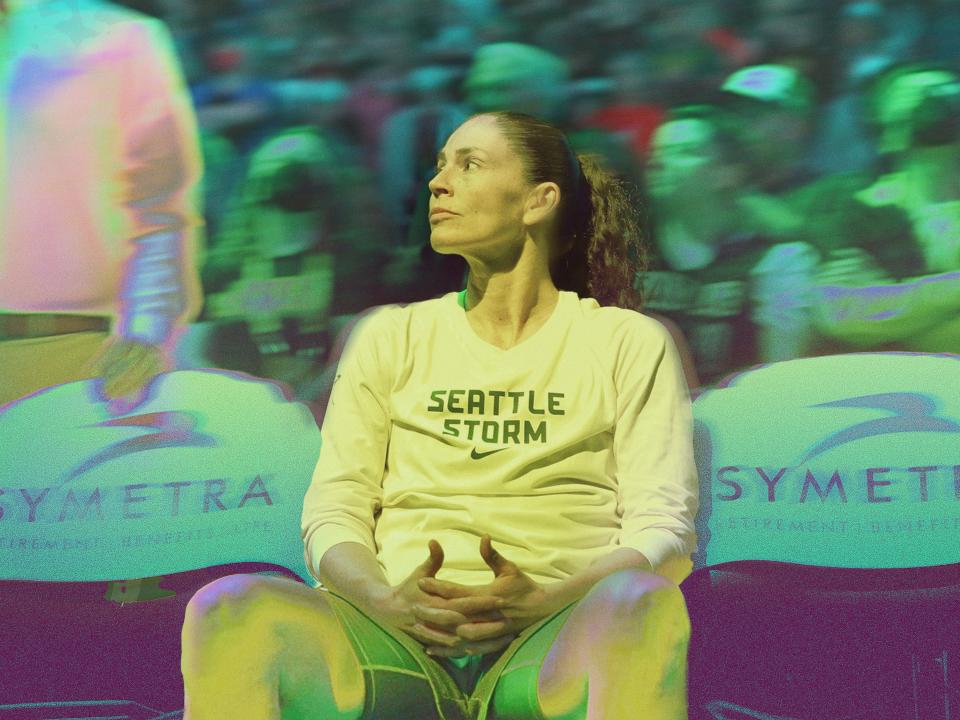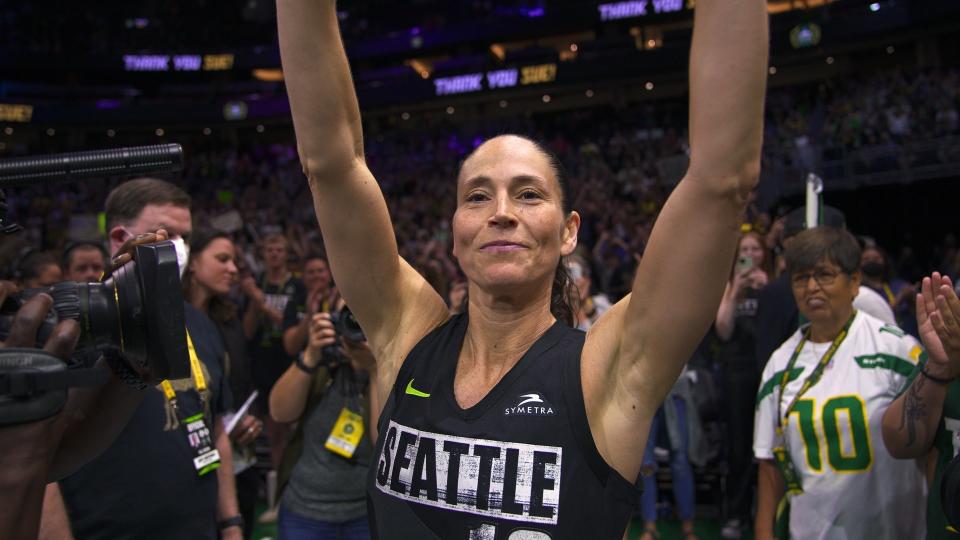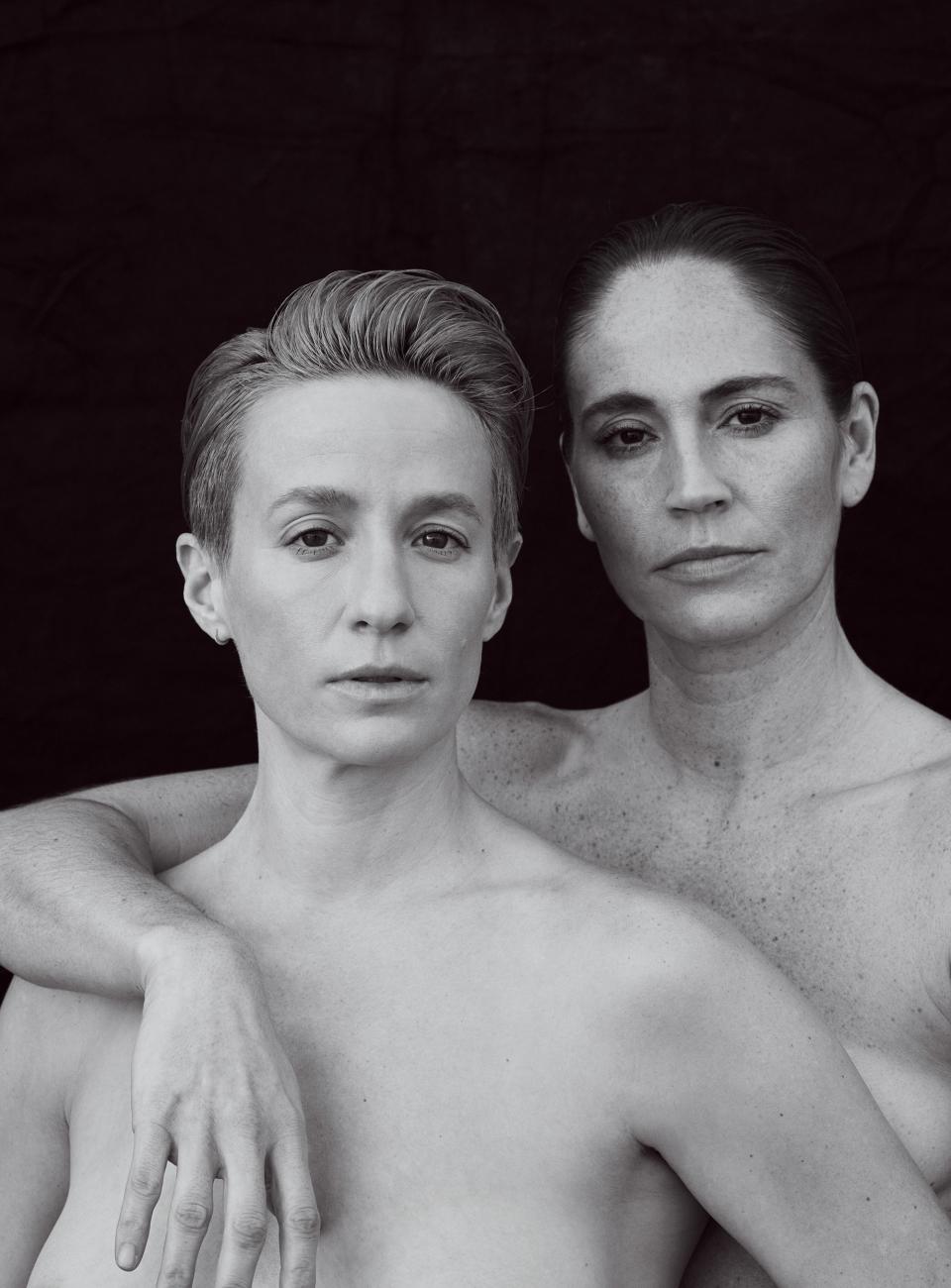Sue Bird Is Glad the World Is Finally Catching Up

Photograph courtesy of WNBA; Collage: Armando Zaragoza
One day earlier this spring, I walk into a restaurant in lower Manhattan and find one of the most decorated basketball players in the history of the sport sitting comfortably by herself. We’re a few days out from the release of a documentary that tells the story of her life, but if the restaurant’s patrons know that they’re sitting next to Sue Bird—she of the five gold medals and four WNBA championships—they aren’t making a big deal of it.
It is not hyperbole at all to say Bird had the best career of any women’s basketball player ever. In addition to being the WNBA’s all-time leader in games played, she also holds the records for wins, assists, and All-Star appearances. She’s got two college championships to go with the four pro ones, as well as five EuroLeague championships picked up during the WNBA offseasons. Her college teammate and dear friend Diana Taurasi may have more points, but Bird has the edge in rings. Other players like Lisa Leslie, Candace Parker, and Maya Moore were more dominant at their peaks, but their careers didn’t have the same longevity. Only one player in league history (Rebekkah Brunson) has more championships than Bird, but Brunson wasn’t an offensive focal point of her teams in the same way. You can go a step further and say that Bird is in the conversation with players like Magic Johnson and Steph Curry as the greatest point guards in hoops history.
For a long time, she was pointedly deferential about this—happier to pass the ball than take the shot, if you will. Not quite a decade ago, though, things began to change. She came out publicly as gay in 2017, and began dating soccer superstar Megan Rapinoe. Together, they launched a production company to amplify underrepresented groups. Now she’s got a documentary—Sue Bird: In the Clutch, currently available on Apple TV, Amazon Prime Video, VUDU, and Wolfe On Demand—that tells the tale of young Sue in Syosset, Long Island, all the way up to her retirement tour in 2022. While the pass-first, shoot-later values are drilled deeply into her psyche, she’s letting it fly a little more in retirement.
“I think what happened probably was, as I got older, I just let go a little bit,” she explains. “Dating Megan one hundred percent nudged me—and maybe even put it on fast-forward a little bit—but yeah, I feel like all of that in a pot is kind of what got me to 2017. And then in subsequent years, just being vocal and more comfortable in my skin.”
There’s the outward signs of that, like a flashier, hipper wardrobe that’s heavier on streetwear than on Banana Republic (her words). But there’s also an ease in her voice when she talks about certain things from her past that other people might cringe at. Like the time, as a twentysomething, before the general public knew she was gay, she walked a red carpet with Backstreet Boy Nick Carter. Or an infamous Dime Magazine photoshoot in which Bird was depicted in a hyper-sexualized way—lying supine on a bedsheet wearing just an Allen Iverson jersey in one shot, posed seductively with one shoulder of the jersey pulled down in another.
“Those photos were done in 2003,” she says. “I was just figuring out what the fuck was up. I knew that I liked girls, I just wasn't sure what that meant or how it fit. Or am I bi? Because I dated guys? Am I bi or am I gay? Does it even matter? I'm doing that whole juggle in my head. There's a little voice that's saying, This is how you market yourself and it’s okay, this is going to push women's sports forward because sex sells and shit like that.”
Listening to Bird recap her life as a true pioneer of women’s sports, watching her mental wheels turn as she explains how those moments shaped her, is an illuminating experience. Even with her conscious choice to live a significantly less guarded life in recent years, I get the sense she’s happy to go even deeper.
Women’s sports has made undeniable, tangible progress since Bird was drafted—thanks in large part to her own efforts to grow the game. And the maelstrom of coverage it’s gotten in the last few years—currently at new heights thanks to the Caitlin Clark phenomenon—in Bird’s eyes, is the truest sign of an evolution she was waiting on for years. Bird sees women’s sports' emphatic entrance into the zeitgeist as a result of the athletes themselves constantly plowing forward. And while women's sports were often met with indifference or even hostility during her career, it seems like the world is finally ready to tune in.
She poses a rhetorical question: “What makes the WNBA—and women's sports in general—hit right now?” And then she answers. “A lot of reasons, but one of them is authenticity, whether it's around sexuality or around social activism. We stepped into our power, in a way, just being real about all the shit that we all deal with and being able to talk about it because it impacts others, right? We were [previously] living in a time in society where you could be racist and sexist and homophobic.”
But, she explains, it wasn’t as easy as simply telling the rest of the world that it was behaving unacceptably. “Imagine we're women being like, ‘This is happening,’” she posits. “Everyone would've been like, ‘Shut the fuck up.’ I like to give all of us some grace. Because for me personally, I could look back and be like, Oh, why didn't I say this sooner? Why didn't I speak up more? And I don't think it's a cop out to say nobody would've fucking heard it anyway. I always say the biggest story around the WNBA is that society caught up with us.”

Technically, I tell Bird shortly after sitting down, we used to be coworkers. During the Seattle Storm’s 2017 season, which was also when she publicly came out to the world, I was working as an intern for the team. The Bird I was around then—in the final chapter of her career but still one of the league’s top point guards, simultaneously trying to navigate an ongoing season, the attention around her sexuality, and her newly public relationship with Rapinoe—was, intentionally, not as exposed as the 2024 version. In other words, 2017 Bird would not have gone on Pablo Torre’s podcast to talk casually about her sex life, which she and Rapinoe did earlier this year.
“I think I do have some shyness, for sure,” she says, explaining the gap between who she was then and who she is now. “I’ve actually kind of embraced the word private because I think it's just an easy-to-consume word for people. Like, ‘Oh, I'm a little more private.’ I don't even know that I am private! I don't know if that's the exact word to describe it. I’m independent. It's like a mix between maybe a little bit of privacy but a little bit of shyness, which probably is just tapping into being a people pleaser, which is something that I think is just embedded.”
Perhaps it’s an after-effect of creating a documentary about her own life, or a dash of post-career clarity, but Bird is an open book these days. One notable portion of the film dives into her parents’ split. It’s striking to hear Bird unpack the divorce, but it’s particularly fascinating to hear her connect it to her identity as an athlete. The iconic point guard tells me that her parents’ separation shaped, among other things, the way she played her position. “Now we're going into childhood trauma!” she smiles. “All of that plays a role in what made me such a good point guard. Putting everybody's needs first, making sure the team is happy and then, ‘I’ll get mine later.’ It's interesting how the things that might hold you back in some facets of life actually helped me succeed in sports. I was rewarded for it.”
Bird wasn’t quite in the first class of WNBA players, but she was close. She entered the WNBA ahead of the league’s sixth season of existence, fresh off a dominant run at UConn capped by a 39-0 record as a senior. She was the first overall pick in the 2002 draft—but quickly became one of the faces of the league for reasons having nothing to do with her skills. Almost immediately, Bird was typecast as the girl next door.
It wasn’t just that the media saw her a certain way—it was that her employer did, too. “I basically said it in a WNBA commercial: There was like a, ‘I'm not as sweet as you think I am’ line,” she remembers. “I don't know that I understood what that was, like, dripping in during those years. Now that I know, yeah, it's pretty disgusting.” To a degree, these were just the costs of being a female athlete in the early aughts—but they were compounded by the fact that Bird didn’t feel she could be open about her sexuality.
“I don't know that I am getting mad that people are assuming I'm straight. I get it,” Bird says of her mindset during the 2000s. “But there came a point in time where it was like, ‘Well, she hasn't had a boyfriend in a while.' What?" She then tells a story of coming out to a childhood friend. “He goes, ‘Wow! I just thought you weren't boning anybody for five years!’ I was just single! Not doing anything with anybody. Maybe making out with somebody, but a kiss is not a contract.”
The WNBA, still a fledgling league, seemed thrilled to have someone like Bird—white, conventionally attractive, personable—to help market itself. But the way she was presented to the public never lined up with the way she saw herself. Bird shares that, once, a league employee suggested that the best way for her to make money as a female athlete was to lean into sex appeal. “They told me, you have the look,” she remembers. “As a child of divorce, people-pleasing person? I was like, ‘Give me all the dresses!’ It’s kind of fucked up, but yeah, that’s basically what happened.”
But the documentary isn’t all heavy stuff. Lighter moments include a bit on her fondness for Wildrose, a legendary lesbian bar in Seattle’s Capitol Hill neighborhood. There’s also fun footage from her college days, where domineering head coach Geno Auriemma challenged Bird relentlessly.
Sue Bird and Megan Rapinoe both had Hall of Fame–worthy careers before they met. But to reach new, boundary-obliterating levels of achievement on and off the field, they needed each other. And, as they tell Emma Carmichael, their work is just getting started.
Then there’s the revelation that she was planning to retire after the 2020 Olympics. But the pandemic pushed them back a year, and so she stuck around all the way through the 2022 WNBA season before hanging it up, wanting to play in the Storm’s newly-renovated Climate Pledge Arena rather than going out in Everett, a city roughly 30 miles north of Seattle that was the team’s temporary home in 2021. To be clear, Bird still thinks she could get out there right now at age 43 and hold her own. “Honestly, if I wanted to, I could still go play. I just didn't want to do it anymore,” she says. When viewers see the intense body maintenance required of a 20-year veteran—housing handfuls of collagen, anti-inflammatory meds, fish oil, and other supplements all in one gulp, plus the grueling sessions with her trainer, Susan Borchardt—they’ll understand what she means.
Bird says all of that was necessary to get her to a point where she could keep performing at a high level after late-career hip and knee surgeries. “I don't think a lot of people fully understand how tore up my knee is,” she explains. “I mean, name a surgery and I've had it. Sometimes my doctor would be like, ‘Oh yeah, you have the knee of a 75-year-old.’” But even in her final season, at age 41, Bird was an All-Star who averaged six assists per game, same as her rookie season. Her Hallmark moment during her final playoff run proved too good to be true, though. She swished a late-game three in the 2022 semifinals against Las Vegas that turned the home crowd in Seattle completely delirious, but a teammate’s mental mistake in the final seconds sent the game to overtime, where a deflated Storm team eventually lost. Bird doesn’t hold a grudge, though. “It’s happened to every athlete,” she shrugs.
It’s hard not to look at Bird’s career and wonder how it might have been different had she started just a few years later. We’re speaking a few days before the Caitlin Clark-Angel Reese rematch that draws more viewers than a typical NBA Finals game. Bird is glad for the increased attention, but clear that it’s not because today’s players are more skilled than she and her contemporaries were. “To me, what was not lacking in women's basketball was exciting players and talent. What was lacking was the coverage of it,” she says. Of course, sometimes individual players can shift the game. “Caitlin, as talented as she is, I do think her long distance shooting is what makes her compelling and exciting,” she notes. “I call it the antidote to dunking. What are we always fucking hearing? You guys can't dunk, you suck. But when dudes who say that watch Caitlin, they're just like, ‘Whoa, legit!’ That to me is what makes her unique and special. But there's been plenty of talented players before Caitlin, and there'll be talented players after. It's not like she’s the only talented player we've ever seen. It's just her talent matched up with the moment perfectly."
That moment, in many ways, is what Bird was waiting for, and why she felt now was the time to give her life the documentary treatment. There’s an old adage that every athlete dies twice: the day they retire from their sport, and the day they actually leave this mortal coil. Bird admits that she didn’t feel that proverbial death, but struggled nonetheless with identity once basketball was out of the picture. “It's still weird when I'm introduced as a 'former' player or a 'retired' WNBA player,” she says. “The used to be of it all. But what I've realized is I'm basically just the same person. All the shit that I learned in basketball, the skills, all the lessons, whatever the hell you want to call it, all of that made me who I was. I just don't have the basketball part. So there's a little bit of mourning there, but I'm still the same person!”
Originally Appeared on GQ

 Yahoo Sports
Yahoo Sports 

